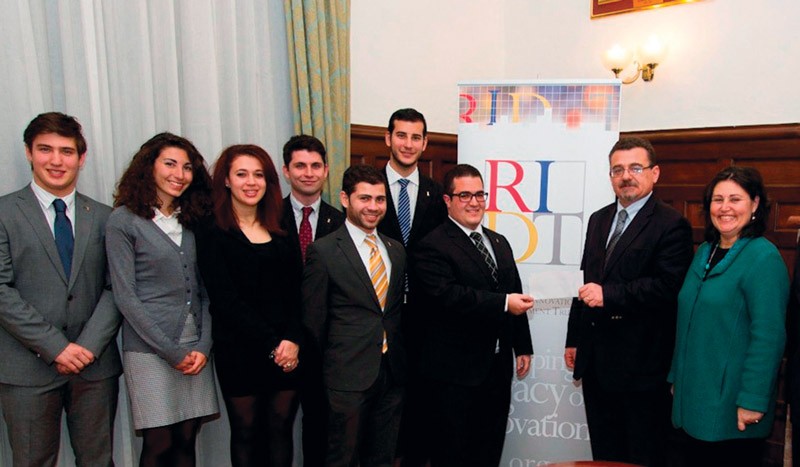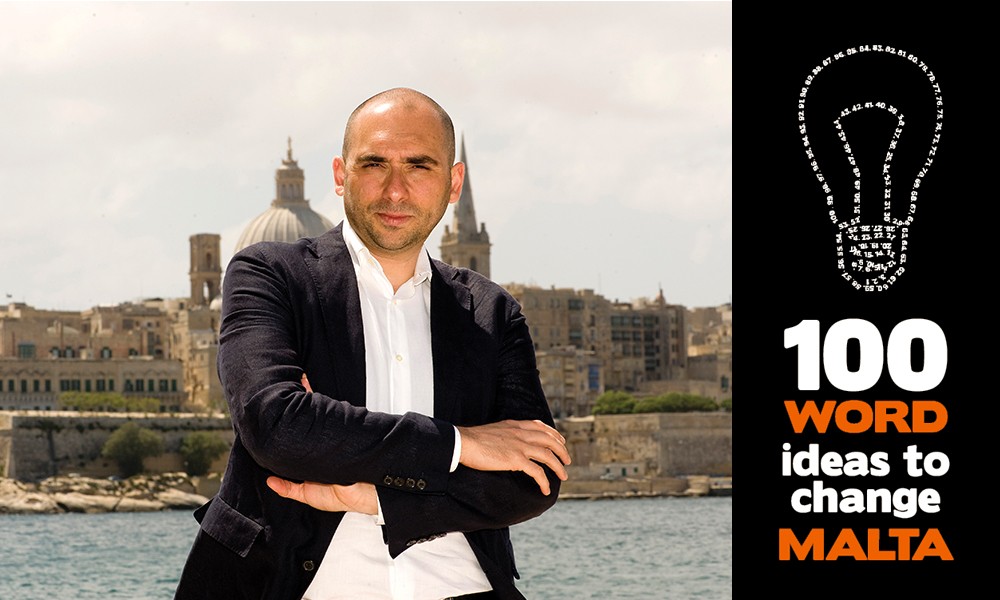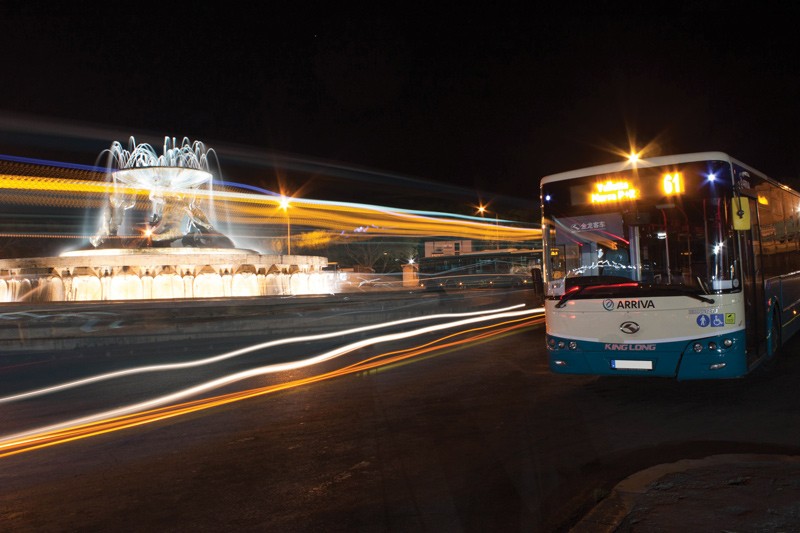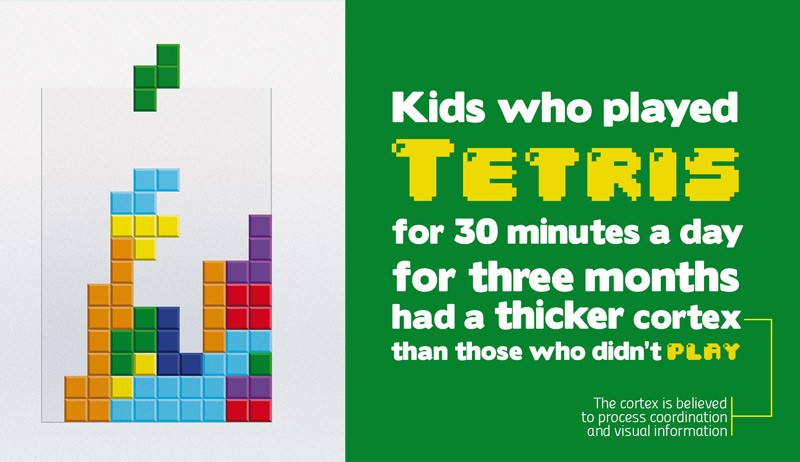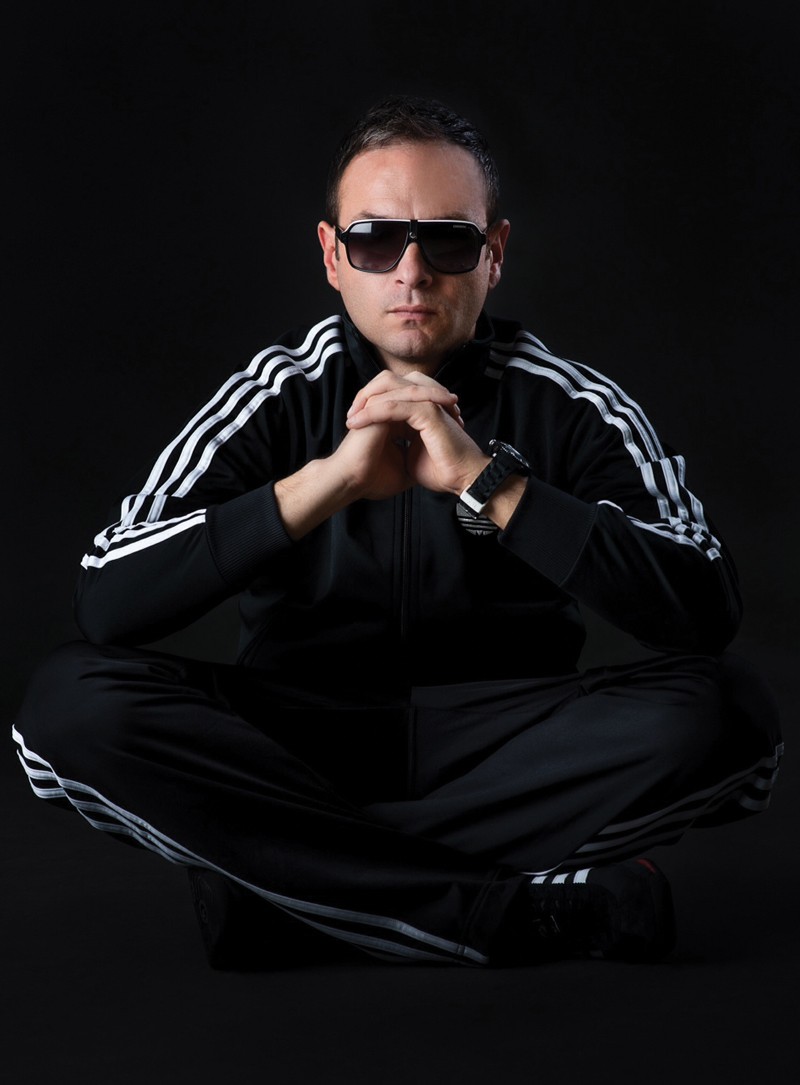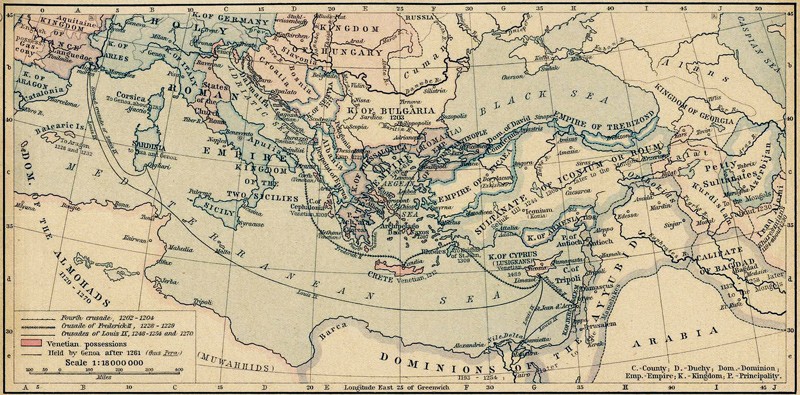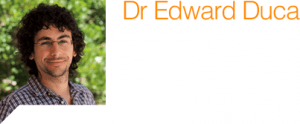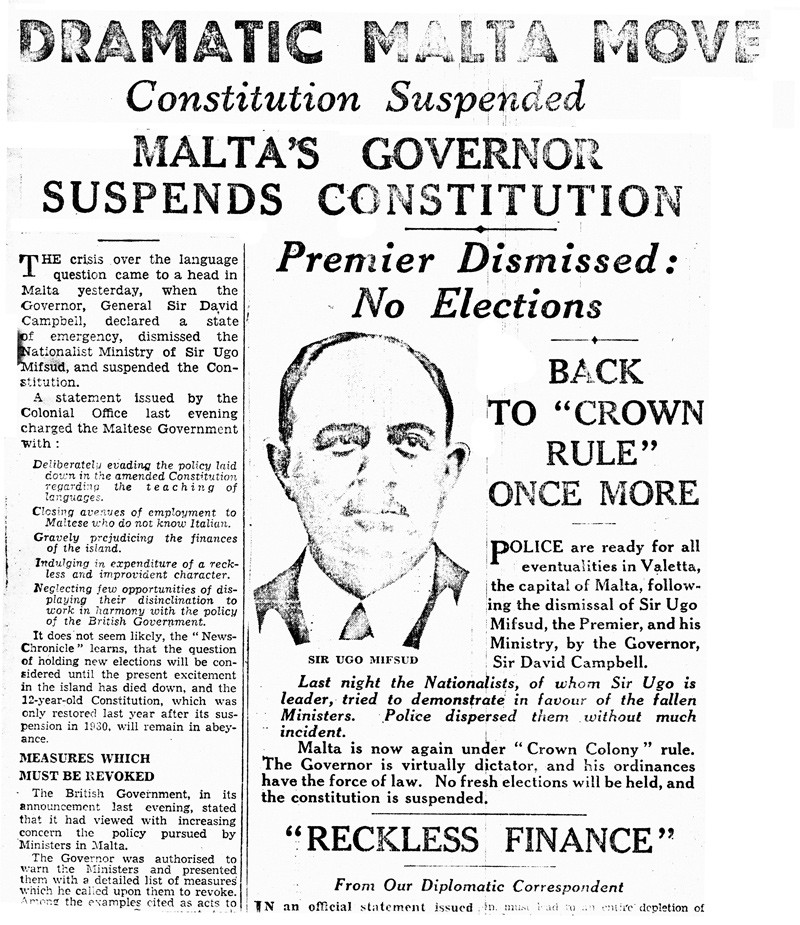In a typical case of charity beginning at home, the Kunsill Studenti Universitarji (KSU) has donated €1,000 towards the research trust of the University of Malta. Speaking during the presentation of the donation, Mr Mario Cachia, former president of the KSU pledged that the KSU shall venture to promote the objectives of the Trust among the students it represents, and encourage them to support it, even by organising activities to raise funds for specific future research.
Can you die of boredom?
A tricky question since boredom is a mental state. Usually it is triggered by an uninspiring, monotonous environment and/or certain brain chemicals like dopamine (more on dopamine). People who produce less dopamine, or are less sensitive to it, are bored more easily.
People bored for a very long time can suffer from clinical depression, which surely reduces lifespan. Other boredom sufferers have ADHD (attention deficit hyperactive disorder) and extreme ways of combating boredom can be equally dangerous. They could abuse drugs and alcohol or seek thrills in risky sports. Others could become sexually promiscuous. All of these behaviours reduce lifespan.
Send your questions to think@um.edu.mt and we’ll find out if it’s the truth or just a fib!
An Alternative Currency
Mario Frendo
Malta — a tiny Island, a minute social reality, a precursory canovaccio of European unification — has a unique asset it ought to be prouder of: Culture. For millennia our bonsai place has attracted a continuum of passing civilisations leaving behind them a most colourful and diverse compendium of customs, behaviours, artistic expressions, and intellectual attitudes. Malta’s investment in this unique legacy should not be limited to conservation. It needs to be kept alive through constant support of the contemporary expression of its youth. This attitude will certainly transform our Culture into a most effective and efficient currency of change and growth.
To drive or not to drive
Rush hours, feasts, festivals, beaches in summer, Paceville on Saturday night, all have one thing in common: traffic. Malta has one of the largest traffic problems in the world. Researchers at the University of Malta are trying to figure out what can be done to ease road rage and reduce drivers’ lost time.
Continue reading
Learning for the Future
Video games make billions as part of the entertainment industry. Parents often view them as a waste of time. Prof. Charles L. Mifsud talks about studies showing their use in education. Cleverer, alert, interested students could be coming to a classroom near you.
From DJ to videographer: Ruby on Science
Lily Agius, the artistic curator of Science in the City met up with DJ Ruby to talk about science and art. Ruby created a video for Science in the City that will be available in 2013 on scienceinthecity.org.mt
– Recently, you progressed from DJ to VJ (video jockey). Was it a hard transition?
No, not really, because it has taken quite a few years to get it in motion. For the past 5 years I have been working with videography on an amateur basis, but all of a sudden at the beginning of this year I decided to take it on professionally, and in a matter of few weeks I learned all that I needed to.
– Which was the art installation or event that you enjoyed the most?
Certainly the live music session by Andrew Alamango and Mario Sammut a.k.a Cynga. It was electronically based, which is my cup of tea.
– One of the exhibits in the exhibition at St James presented fruit flies within their own eco system in bulbs. These organisms are used to investigate muscle-wasting diseases, obesity, cancer, diabetes, and more. Did you ever imagine that humans could be related enough to a fruit fly to use them to learn more about human disease?
I never knew about it before. I was mesmerised to find out at the exhibition at St. James. That was very interesting!
– How did you feel when interacting with the art: climbing the DNA staircase, or entering the echo-proofed room in Strait Street?
It was an amazing experience, not just as a regular person attending the event but also as film maker while on the job.
– Have you ever been to a festival of its kind in Malta or abroad before?
It was a first for me, and was very impressed about how professional the event was.
– Did you expect to see something more from the festival? Is there anything you would like to see at the festival next year?
Well, from my point of view it may be no surprise to hear me say: more music.
– How would you describe the audience of the Science in the City Festival?
People of all ages and from all walks of life were there — it was certainly an event for everyone!
– Do you think that art can be used to explain science?
Yes it can, Science in the City proved that.
– How does science play its part in your own life?
I am very into IT, computers, software, gadgets and electronic music/visual. Technology is all around me and with me everyday, and forever evolving and improving.
Part of Science in the City, Malta’s Science and Arts Festival
For more stories click here
For more information on DJ Ruby: www.pureruby.com or www.facebook.com/djruby. For Ruby’s videography and visual work: www.facebook.com/puremediamalta
Football like you’ve never seen it before
Freeviewpoint television (FTV) is expected to become the ultimate 3D TV experience. With FTV, the viewer can choose from which angle and position to view a scene. Want to watch football from above, the East Wing, or with your fellow fans? At the press of a button, with FTV you can. For FTV to work, the same scene needs to be captured from a number of different viewpoints and the virtual scenes in between generated. To broadcast the service requires a huge bandwidth, which on your mobile would quickly soak up all your data. Current mobile FTV frameworks cannot handle the broadcast capacity required and FTV has never been deployed over a specific cellular technology.
Terence Zarb (supervised by Dr Ing. Carl James Debono) proposed a framework to compress and transmit FTV to mobile devices. The system was adapted for the next generation long-term evolution (LTE) networks, currently available on high-end smartphones. To reduce bandwidth and reduce mobile phone workload, the FTV broadcast data is processed at the transmitting end, before it is sent over the mobile network. The physically captured views are transmitted. Depending on the user’s choice, the mobile phone either presents one of these views or generates an arbitrary viewpoint. By using the novel proposed framework, the bandwidth required was reduced by over 70% compared to current methods. It also provided a better viewing experience.
Taken together, the proposed framework can realistically be deployed on LTE networks, which means we might be seeing an incredibly innovative way of viewing sport, documentaries and maybe even films on our 3D TVs — is that enough to make you buy one?
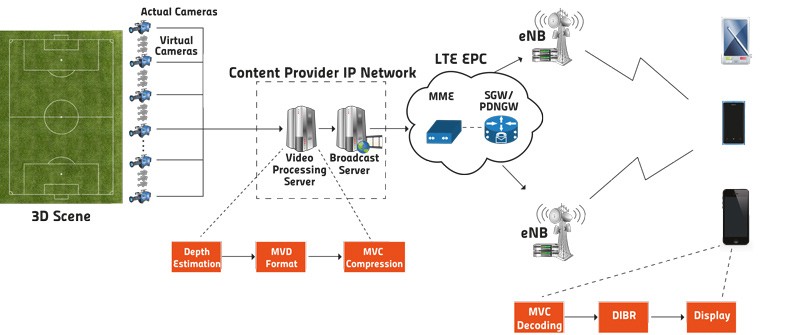
This research was performed as part of a Masters of Science in Information and Communication Technology at the Faculty of Information and Communication Technology. The research is partially funded by the Strategic Educational Pathways Scholarship Scheme (Malta). The scholarship is part-financed by the European Union – European Social Fund, under Operational Programme II – Cohesion Policy 2007-2013, “Empowering People for More Jobs and a Better Quality of Life”.
Islands and Security
Islands have played different and unique roles throughout history. The process of decolonisation, starting in the late 50s, led to a proliferation of small island states. These new independent nations sought to develop their own foreign and security policies.André P. DeBattista (supervised by Dr Isabelle Calleja Ragonesi) studied International Relations in Malta’s history to examine the role of small island states in regional and global security. He found that small island states reinforce security and can stabilise regions.
Due to their geography, small islands can wield disproportionate influence. They may serve as military outposts and control waterways used for commerce, trade and defence. However, islands can still be vulnerable, weak and externally manipulated. For millennia, Malta has been fought over by regional powers for purposes of trade and defence. In 1964, for the first time in its history, Malta became independent and could chart its own political trajectory. Despite political independence, it was and still is reliant on other states.
Throughout its history, Malta has played an important role in the provision of regional security. It had a strong influence in both the Cold War period and also after its recent accession to the EU. DeBattista believes that Malta is well positioned to spearhead research on small islands; “as a small island state, Malta managed to adapt to different circumstances and challenges. It excelled both within its region and in the international community. This success should encourage us to conduct further research in this niche area, in order to provide solutions and policy options to other small island states.”
This research was undertaken as part of a Masters of Arts in International Relations.
Laughter is the best medicine
 Creativity and humour are being used by Dr Joseph Agius to help people who stutter. His techniques have helped hundreds in Malta. They are now being used all over Europe, which is no laughing matter. Words by Dr Edward Duca
Creativity and humour are being used by Dr Joseph Agius to help people who stutter. His techniques have helped hundreds in Malta. They are now being used all over Europe, which is no laughing matter. Words by Dr Edward Duca
Maltese history: not as we remember it

